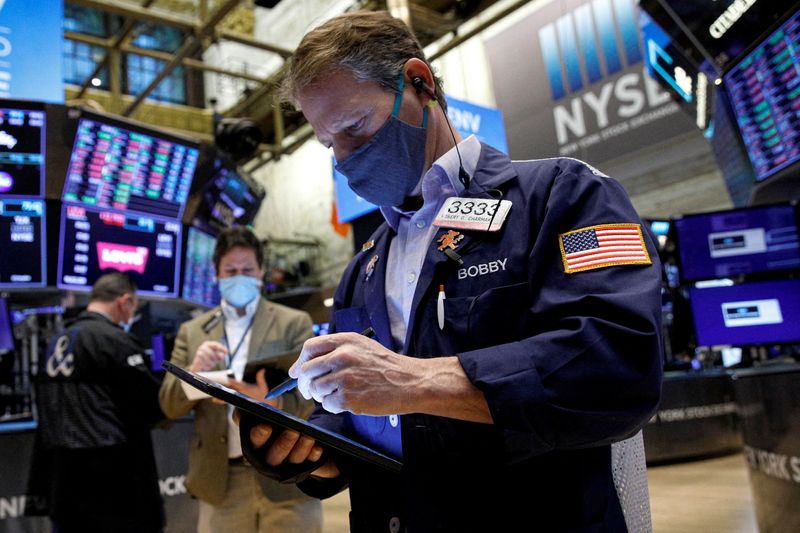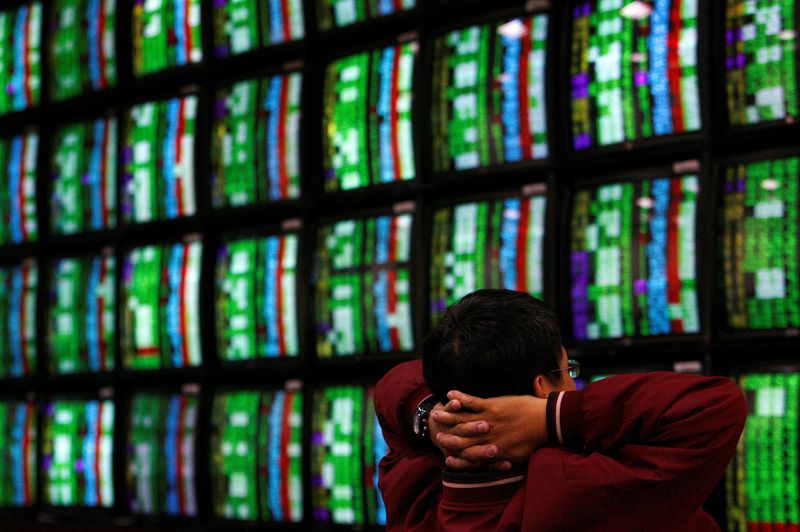By Koh Gui Qing
NEW YORK (Reuters) - Nervous global stock markets tumbled on Thursday as the dollar wilted, after a drumbeat of hawkish remarks from Federal Reserve officials made clear that U.S. interest rates could rise as soon as March, putting an end to ultra-easy monetary conditions.
Fed Governor Lael Brainard became the latest and most senior U.S. central banker to signal that rates will rise in March to fight inflation, saying that the Fed "has projected several rate hikes over the course of the year".
Indeed, data released on Thursday that pointed to rapidly tightening U.S. labor market conditions presaged the supply bottlenecks and persistent inflation pressures that could come, further unsettling investors already nervous about imminent rate hikes.
MSCI's gauge of stocks across the globe had shed 0.92%, as stocks in Europe and the United States slipped into the red.
After spending much of the day nursing modest declines, U.S. stocks deepened losses toward the end of the session. The S&P 500 lost 1.4%, the Nasdaq Composite dropped 2.5%, and the Dow Jones Industrial Average lost 0.5%.
The pan-European STOXX 600 index ended flat as losses in defensive stocks were matched by gains in automakers and technology stocks on hopes of improving semiconductor supply. (EU)
"We do not think the returns from many financial assets will be as good in 2022 as they were in 2021," said John Higgins, chief markets economist at Capital Economics.
"For a start, we envisage a sell-off in government bonds in most places, reflecting the outlook for monetary policy. And, in general, we foresee an underwhelming performance from equities, including in the United States and China."
Data released on Wednesday had showed U.S. consumer price inflation bounding 7% on an annual basis in December, the highest since 1982. While the report was widely expected, it left investors almost certain that U.S. rates will rise in March.
"As we see it, the inflation story is going to persist for a good while longer yet," said Manulife Asset Management's global macro strategist, Eric Theoret.
"We have had a tremendous acceleration in the Fed's tightening," he added. Theoret pointed out that when the U.S. central bank raised interest rates in 2015, it waited two years before shrinking its balance sheet, whereas this time it could begin by the end of the year.
"The challenge from here is how the global economy responds to this normalization."
In bond markets, where borrowing costs have raced to keep up with rate hike expectations this year, 10-year U.S. Treasury yields edged down to 1.7006%, though analysts say they are almost certain to climb higher this year against a backdrop of rising rates. Germany's 10-year yield bobbed near -0.086% having approached positive yield territory for the first time since May 2019.
European Central Bank Vice President Luis de Guindos became the latest to warn that the current spike in inflation was not going to be as transitory as originally expected. Upmarket Swiss bathroom goods giant Geberit had seen its shares slide too as it warned it was now impossible to predict how much raw materials prices would rise this year.
It is a busy period for bond issuance as countries and companies look to beat the rise in rates. Italy was due to sell up to 7 billion euros of three- and seven-year bonds later, and Ireland was eyeing a bumper sale. The week is also set to be a record one for emerging market corporate debt sales with nearly 30 taking place.
"It is a record in my time," said Omotunde Lawal, head of emerging markets corporate debt at Barings. "Most people are swamped, but you can see why with as many as four Fed hikes now priced in." (Graphic: global cbanks, https://fingfx.thomsonreuters.com/gfx/mkt/gdpzykbekvw/cbank%20sheet.JPG)
DOLLAR DOLDRUMS
In the currency markets, the dollar continued to slip toward a two-month low against a basket of currencies, with the dollar index down 0.139% at 94.873.
The euro was a big beneficiary of the move and was steady at $1.14530, up 0.1% on the day, while sterling and the yen also extended recent gains. [/FRX]
The pound is up more than 4% from December lows and traders have so far shrugged off a political crisis enveloping Prime Minister Boris Johnson, who apologized on Wednesday for attending a party at his official Downing Street residence in May 2020 during a coronavirus lockdown.
The central bank of New Zealand has begun hiking rates too, and the New Zealand dollar climbed 0.2% to $0.68625, the highest in almost two months.
"The (U.S.) dollar does not have to increase because the Fed is readying a tightening cycle," said Commonwealth Bank of Australia (OTC:CMWAY) strategist Joe Capurso.
"It is not a simple equation of Fed hikes equals dollar increases. The dollar is a counter-cyclical currency which decreases as the world economy recovers."
In Asia, Chinese blue-chips dropped 1.6% after data showing mainland bank lending fell more than expected in December, causing property and consumption sectors to sink.
MSCI's broadest index of Asia-Pacific shares outside Japan was flat after recording its biggest daily gain in a month on Wednesday. Japan's Nikkei lost nearly 1% after surging nearly 2% a day earlier.
Oil prices ticked lower in commodity markets too, a day after hitting their highest in nearly two months. [O/R]

U.S. crude fell 1.36% to $81.52 per barrel and Brent was at $83.86, down 0.96% on the day.
A softer dollar did not bolster bullion prices, which were instead weighed down by the prospect of rising rates. Spot gold dropped 0.2% to $1,822.08 an ounce. U.S. gold futures fell 0.65% to $1,821.20 an ounce. [GOL/]
(Additional Reporting by Tommy Wilkes in London and Andrew Galbraith in Shanghai; Editing by Tomasz Janowski, Toby Chopra, Jonathan Oatis and Alexandra Hudson (NYSE:HUD))
